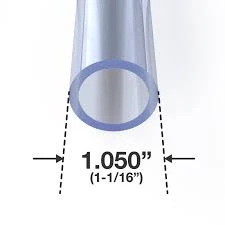Nov . 09, 2024 09:23 Back to list
Durable PVC Electrical Conduits for Reliable Wiring Solutions in Various Applications
The Versatility and Applications of PVC Electrical Pipes
Polyvinyl chloride (PVC) electrical pipes are an essential component in modern electrical installations. Known for their durability, lightweight nature, and resistance to corrosion and moisture, these pipes are widely used in various electrical applications. This article aims to explore the characteristics, advantages, and applications of PVC electrical pipes, illustrating their importance in both residential and industrial environments.
PVC is a synthetic plastic polymer that has gained immense popularity due to its versatility. In the context of electrical installations, PVC pipes provide a protective conduit for electrical wiring. The primary function of these pipes is to safeguard electrical conductors from physical damage and environmental factors such as moisture, chemicals, and extreme temperatures.
The Versatility and Applications of PVC Electrical Pipes
Another notable feature of PVC electrical pipes is their high resistance to corrosion. Unlike metal conduits that may rust or corrode over time, PVC does not react with moisture or most chemicals, ensuring a long life cycle. This property is particularly beneficial in environments that expose electrical installations to humidity or harsh chemical substances. Additionally, the UV resistance of PVC makes it suitable for outdoor applications, where prolonged exposure to sunlight can degrade other materials.
pvc electrical pipe

PVC pipes also provide excellent insulating properties. They do not conduct electricity, which further enhances the safety of electrical systems. By separating electrical wiring from other construction materials, PVC electrical pipes help to prevent short circuits and potential electrical hazards. This characteristic is particularly crucial in residential electrical installations, where the safety of inhabitants is a top priority.
In terms of applications, PVC electrical pipes are commonly used in residential, commercial, and industrial settings. In residential buildings, they are used to house electrical wires and cables, protecting them from damage and reducing the risk of fire hazards. In commercial settings, PVC pipes are employed in various wiring systems, including lighting, heating, and air conditioning systems.
In industrial environments, the versatility of PVC pipes makes them ideal for use in factories, warehouses, and power plants. They can be used to create complex wiring networks that can withstand the rigors of industrial operations. Moreover, PVC is often used in cable management systems, helping to organize and protect power and data cables in a seamless manner.
Despite their numerous advantages, it is essential to consider local building codes and regulations when using PVC electrical pipes. Some jurisdictions may have specific guidelines regarding the installation and use of PVC in electrical applications. Electricians and installers must stay informed of these regulations to ensure compliance and safety.
In conclusion, PVC electrical pipes are a versatile, durable, and cost-effective solution for electrical installations. Their lightweight nature, resistance to corrosion and chemicals, and excellent insulating properties make them highly suitable for a wide range of applications. As technology continues to advance and the demand for efficient electrical systems grows, the relevance and importance of PVC electrical pipes will undoubtedly continue to thrive in the construction and electrical industries. Whether in residential or industrial settings, these pipes play a crucial role in ensuring the safety, efficiency, and longevity of electrical systems.
-
HDPE Natural Sheet: Durable, Food-Grade & Versatile Plastic Solutions
NewsAug.27,2025
-
Durable Glossy PVC Rigid Sheet | Premium High-Shine Panels
NewsAug.26,2025
-
Durable PP Rigid Sheet: Lightweight, Chemical Resistant Solutions
NewsAug.21,2025
-
PVC Grey Sheet for Extraction: Chemical Resistant & Durable
NewsAug.19,2025
-
Durable PVC Pipe Fittings for Plumbing & Irrigation Needs
NewsAug.18,2025
-
HDPE Steel Belt Reinforced Spiral Corrugated Pipe | High Strength
NewsAug.17,2025

